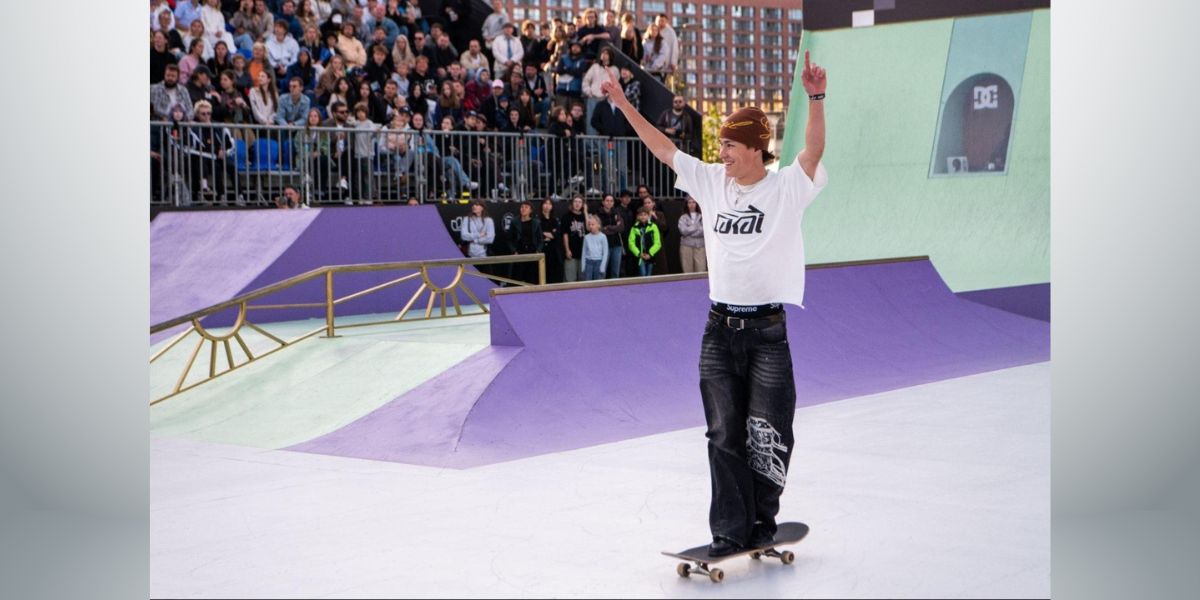By: Matt Emma
Moscow, August 24, 2025 — The roar of wheels on concrete, the shouts of encouragement, and the rhythm of live music: this was the soundtrack of Grand Skate Tour (GST) 2025 in Moscow. With over 250 athletes from 64 countries, the festival was one of the largest international skateboarding events of the year.
Yet behind the high-flying tricks and unforgettable finals lies another story — the people who make it possible. To understand how GST Moscow came together, and where the Tour is headed next, we sat down with Ilya Vdovin, President of the Russian Skateboarding Federation and one of the key organizers of the event.
A Festival with Purpose
For Vdovin, the significance of GST extends far beyond competition:
Q: What was the vision behind bringing GST to Moscow this year?
A: “Our goal was to create not just a contest, but a celebration of skateboarding as a culture. We wanted a place where professionals, newcomers, and fans could share the same space, learn from each other, and feel part of a global community. Skateboarding has always been about inclusion and creativity, and we tried to reflect that in every detail.”
The design of the park, the integration of music and art, and the educational programs for young skaters all reflected this vision.
Global Reach, Local Flavor
Q: How did the international participation shape the event?
A: “This year, we welcomed athletes from 64 countries. That number alone shows how universal skateboarding has become. It was inspiring to see different styles — from Latin America’s explosive energy to Japan’s technical precision. Every region adds its own voice, and that diversity is what makes the Tour exciting.”
Indeed, the finals were a showcase of global talent. Athletes from Russia, France, Australia, Peru, Argentina, and Colombia all earned podium places, proving that skateboarding today is shared across continents.
Highlights on the Podium
The women’s division saw Russian skater Tatyana Styrova claim gold with 65.20 points, narrowly beating compatriot Maria Ozhigova (64.93). Colombia’s Jazmin Alvarez completed the podium with bronze.
On the men’s side, Julien Agliardi (France/USA) delivered a flawless run to take the title with 181.00 points, followed by Peru’s Angelo Caro (171.67) and Argentina’s Matias Dell Olio (157.33).
For organizers, the balance of winners was symbolic: “It shows that skateboarding belongs to everyone, not just one country or region,” Vdovin emphasized.
Beyond the Scores
While fans cheered the winners, many also pointed to the festival’s atmosphere as its strongest legacy. Workshops for children, open sessions for amateurs, and cultural performances transformed Khodynskoye Pole into more than just a competition venue.
Q: What role did the non-competitive events play?
A: “We wanted people to feel that GST is for them, even if they’re not chasing medals. The art shows, the music, the community zones — they all helped create an inclusive environment. Many of the young kids who came didn’t just watch; they picked up boards for the first time.”
The Voice of the Athletes
Organizers also emphasized listening to participants. Several athletes openly praised the hospitality and the setup of the event.
Silver medalist Angelo Caro shared:
“From the moment I arrived, I felt welcomed. The organizers paid attention to details — flights, food, practice sessions. Everything worked smoothly, and that let us focus on skating. Moscow surprised me with how comfortable it felt.”
Bronze medalist Matias Dell Olio echoed this sentiment:
“I’ve been part of GST for years, and what makes it unique is that it feels like family. The organizers understand skaters because they come from the culture. That’s something rare and valuable.”
Challenges Behind the Scenes
Q: What was the biggest challenge in organizing such a large-scale event?
A: “The logistics are always complex — bringing athletes from dozens of countries, ensuring equipment and facilities are world-class, coordinating with partners. But the real challenge is creating the right spirit. You can build ramps, but you can’t buy atmosphere. That comes from how you treat people, how you involve the community, and how you balance professionalism with authenticity.”
Looking Ahead
Q: Where do you see the Grand Skate Tour going in the future?
A: “The dream is for GST to become a permanent fixture of the global skate calendar. Not just in big cities, but also in places where skateboarding is still growing. We’re already in talks about expanding stops in Asia, Africa, and South America. Each edition teaches us something new, and we want to carry that forward.”
A Collective Effort
Before our conversation ended, Vdovin stressed that no event like GST is built by a single team:
“It’s the athletes, the volunteers, the sponsors, the local community — everyone adds a piece. That’s why skateboarding works: it’s collaborative by nature. Our job as organizers is to create the space, but the soul comes from the people.”

Closing Notes
As the sun set over Khodynskoye Pole and the last ramps were packed away, the Grand Skate Tour 2025 had already left its mark. For the skaters, it was a stage to push limits. For fans, it was an unforgettable show. And for the organizers, it was a step toward a bigger vision: a world where skateboarding connects cultures, inspires the next generation, and continues to grow as a true global movement.
The boards may be silent now, but the echo of GST Moscow 2025 will carry far beyond the city — into the next stop, the next contest, and the next chapter of skateboarding’s evolving story.

















